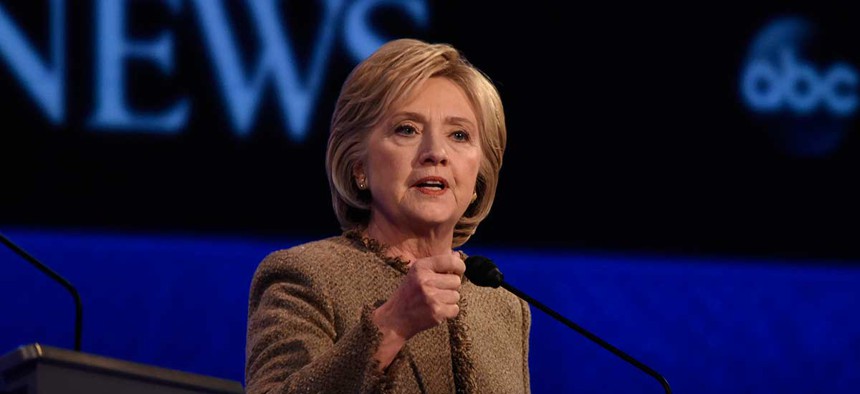
Ida Mae Astute/ABC
Why Hillary Clinton Should Worry About Brexit
Anti-elite sentiment is erupting around the world. And it’s the main reason why Donald Trump remains competitive in the presidential election.
The outcome of the presidential election will hinge on whether disaffected voters believe it is a choice between two candidates or—like Brexit—a referendum on the direction of the country. Hillary Clinton holds advantages over Trump in nearly every way candidates are usually measured: She’s qualified for the job, she’s running a better campaign, and she has the temperament to be commander in chief. But if anxious voters want to take out their deep-seated dissatisfaction on a feckless and feather-nesting establishment—consequences be damned—Clinton should be running scared.
If there’s a parallel between the British vote to withdraw from the European Union and Donald Trump’s presidential campaign, it’s the disconnect between the elite and the people they represent. The vast majority of the British political establishment, mainstream media institutions, and transnational business class sneered at people who wanted to break from Brussels—an attitude disconnected from the sentiments of a majority of the public. Likewise, Trump’s heterodox views on immigration, globalism, assimilation, and trade are entirely at odds with the professional class in both parties, but they resonate with an ascendant populist constituency that has taken hold in 2016.
The demographic breakdown of the Brexit vote was remarkably similar to the contours of the presidential race. Older voters overwhelmingly supported withdrawing from the EU; they also make up Trump’s base of support. The working-class towns outside of London were the strongest bastions of Brexit. Likewise, Trump is still running competitively against Clinton because of overwhelming backing from blue-collar whites. The notion of “two Americas” (popularized by John Edwards, of all people) has never been more relevant.
The voters’ desire to give the proverbial middle finger to the governing class is why Trump—despite his gaffes, ignorance of policy, and erratic temperament—can’t be counted out. Focus groups show that even many Trump supporters have concerns about his ability to serve effectively as president. But they don’t care. On paper, a candidate running on Trump’s issues who understood the importance of putting together a professional political operation would be a potent candidate. But Trump’s unwillingness to take the job of running for president seriously remains a huge vulnerability. His decision in recent days to promote his golf course in Scotland instead of hammering home his own nationalistic campaign message was one of many political opportunities he has missed since locking down the Republican nomination.
Make no mistake: Politically speaking, Clinton is just about the worst possible Democratic nominee to run in these volatile, antiestablishment times. She hobnobs with the global elite, maintains close relationships with Wall Street honchos, has trouble connecting with working-class voters, and carries an air of entitlement. Polls show that voters don’t trust her and don’t much like her. She’s offering a status quo message to an electorate that thinks the country is headed off the tracks.
Trump made an effective anti-elitist case against Clinton in a speech last week. He charged that insiders like Clinton “wrote the rules of the game to keep themselves in power and in the money.” It’s a stinging indictment that goes after her biggest weakness. His problem is that he’s unable to sustain the argument on his own without a teleprompter.
TRAIL MIX:
1. The Florida Senate race has become a case study in Politics 101: Candidates still matter, even if it’s harder for them to distance themselves from their party these days. Sen. Marco Rubio’s entrance in the race alone significantly improved the GOP’s chances of holding the battleground Senate seat. But overlooked in much of the Rubio coverage was the record of his leading challenger—Democratic Rep. Patrick Murphy. Needless to say, he’s not one of the party’s strongest recruits this cycle.
Miami’s CBS affiliate aired a devastating two-part series on Murphy this week, portraying the 33-year-old candidate as an empty suit without any qualifications to be a senator. It reported that he lied about working as a certified public accountant and being a small business owner, while exaggerating other parts of his résumé. It’s hard to imagine a more damaging investigative report on a prominent statewide candidate.
While it’s fashionable to insist that congressional candidates won’t be able win many crossover votes, there are plenty of exceptions to the rule—especially in the Senate. In 2010, GOP Senate candidates Ken Buck (Colorado) and Sharron Angle (Nevada) were so weak that they weren’t able to take advantage of the favorable environment for their party. In 2012, Democrats Claire McCaskill and Joe Donnelly were able to win Senate races in Republican-friendly states that Mitt Romney carried against not-ready-for-prime-time opponents. If Rubio were facing top-caliber competition, this race would be a toss-up. But he holds a distinctive advantage given his competition.
2. There’s a lot of talk that the politics of gun control fundamentally changed after the Orlando terrorist attack. Don’t bet on it. Here’s one sign: More Senate Democrats up for reelection in 2018 broke with their party on one of four gun-related votes this week (Donnelly of Indiana, Heidi Heitkamp of North Dakota, Jon Tester of Montana, and Joe Manchin of West Virginia) than did Republicans on the ballot this year (Mark Kirk of Illinois, Kelly Ayotte of New Hampshire, and Pat Toomey of Pennsylvania). Many swing-state senators in tough races, like Ohio’s Rob Portman and Arizona’s John McCain, held the line against increased regulations on firearms.
It’s possible these Republicans are making a political miscalculation by siding with the National Rifle Association. But when vulnerable Democrats are also agreeing with the gun lobby, it shows that gun control isn’t quite the slam-dunk political issue Democrats want it to be.
3. The Pew Research Center uncovered a sobering statistic about the state of our political polarization: Only 8 percent of Democrats and 9 percent of Republicans are married to a spouse of a different party. AsThe Washington Post’s Aaron Blake reported, this is only a slightly higher proportion of people than are married to someone of a different race, according to a separate 2015 Pew survey.
That’s not all: More than half (55 percent) of Democrats say the Republican Party makes them “afraid,” while 49 percent of Republicans say the same about Democrats. Nearly half of respondents said discussing politics with someone they disagree with is “stressful and frustrating.” This is the state of American politics in 2016.
NEXT STORY: Play of the Day: Trump's Reaction to Brexit







